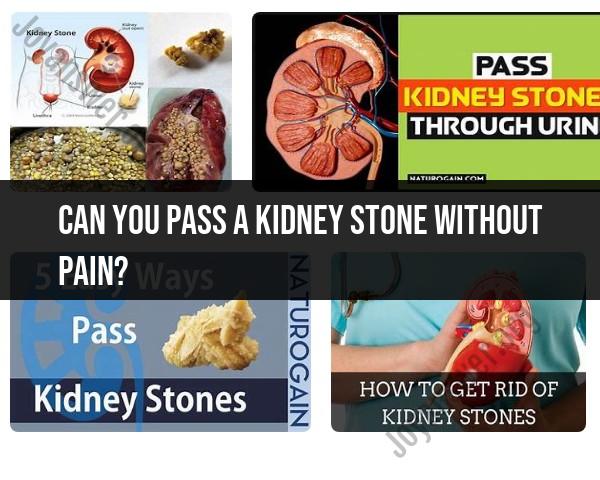Can you pass a kidney stone without pain?
Passing a kidney stone without pain is extremely rare. Kidney stones are small, hard mineral deposits that form in the kidneys and can be very painful when they move from the kidney through the urinary tract. The pain is typically due to the stone getting stuck or causing irritation as it travels through the narrow tubes of the urinary system.
While some small kidney stones might pass through the urinary tract with minimal discomfort, the majority of kidney stones cause significant pain and discomfort. The level of pain can vary depending on the stone's size, shape, and location within the urinary tract. Pain is often accompanied by symptoms such as intense back or abdominal pain, blood in the urine, frequent urination, and pain during urination.
If you suspect you have a kidney stone or are experiencing symptoms, it's important to seek medical attention. A healthcare provider can diagnose the stone, determine its size and location, and recommend appropriate treatment, which may include pain management, medication to help the stone pass, or procedures to remove or break up the stone. It's not advisable to try to pass a kidney stone without medical guidance, as doing so can lead to complications and prolonged discomfort.
Passing a Kidney Stone Without Pain: Is It Possible?
Yes, it is possible to pass a kidney stone without pain. In fact, many small kidney stones pass through the urinary tract without causing any symptoms at all. However, larger kidney stones, or kidney stones that get stuck in the ureter (the tube that carries urine from the kidney to the bladder), can cause severe pain.
Here are some factors that can affect whether or not passing a kidney stone is painful:
- The size of the stone: Larger stones are more likely to cause pain.
- The location of the stone: Stones that get stuck in the ureter are more likely to cause pain than stones that are still in the kidney.
- The sensitivity of the person: Some people are more sensitive to pain than others.
The Painful Journey of Kidney Stones
Kidney stone pain is often described as being sudden and severe. It may be felt in the back, side, abdomen, or groin. The pain may come and go, or it may be constant. Other symptoms of kidney stones may include:
- Nausea and vomiting
- Blood in the urine
- Fever and chills
- Painful urination
- Frequent need to urinate
If you think you may have a kidney stone, it is important to see a doctor right away. Kidney stones can cause serious complications, such as infection and blockage of the urinary tract.
Managing Kidney Stone Discomfort and Pain Relief
There are a number of things you can do to manage kidney stone discomfort and pain relief. These include:
- Drinking plenty of fluids: This will help to flush the stone through your system.
- Taking over-the-counter pain relievers: Nonsteroidal anti-inflammatory drugs (NSAIDs), such as ibuprofen and naproxen, can help to reduce pain and inflammation.
- Applying heat or ice: Applying a warm compress or ice pack to the affected area can help to relieve pain and inflammation.
- Taking a warm bath or shower: This can help to relax the muscles and reduce pain.
If the pain is severe, your doctor may prescribe stronger pain relievers or other medications.
Treatment Options for Kidney Stones
The treatment for kidney stones depends on the size and location of the stone, as well as the severity of the symptoms. In some cases, kidney stones will pass on their own with conservative treatment, such as drinking plenty of fluids and taking over-the-counter pain relievers. However, in other cases, medical intervention may be necessary.
Treatment options for kidney stones include:
- Lithotripsy: This is a non-invasive procedure that uses shock waves to break up the kidney stone.
- Ureteroscopy: This is a minimally invasive procedure in which a thin tube with a camera is inserted into the ureter to locate and remove the kidney stone.
- Percutaneous nephrolithotomy: This is a more invasive procedure in which a small incision is made in the back and a tube is inserted into the kidney to remove the kidney stone.
Preventing Kidney Stones for a Pain-Free Future
There are a number of things you can do to help prevent kidney stones, including:
- Drinking plenty of fluids: This helps to dilute the urine and reduce the risk of crystals forming.
- Eating a healthy diet: Eating a diet that is low in sodium, animal protein, and oxalate can help to reduce the risk of kidney stones.
- Maintaining a healthy weight: Obesity is a risk factor for kidney stones.
- Exercising regularly: Exercise helps to keep the kidneys healthy and reduce the risk of kidney stones.
If you have a history of kidney stones, your doctor may recommend additional preventive measures, such as taking medications to reduce the amount of calcium or oxalate in the urine.
By following these tips, you can help to prevent kidney stones and avoid the painful journey of passing a kidney stone.












